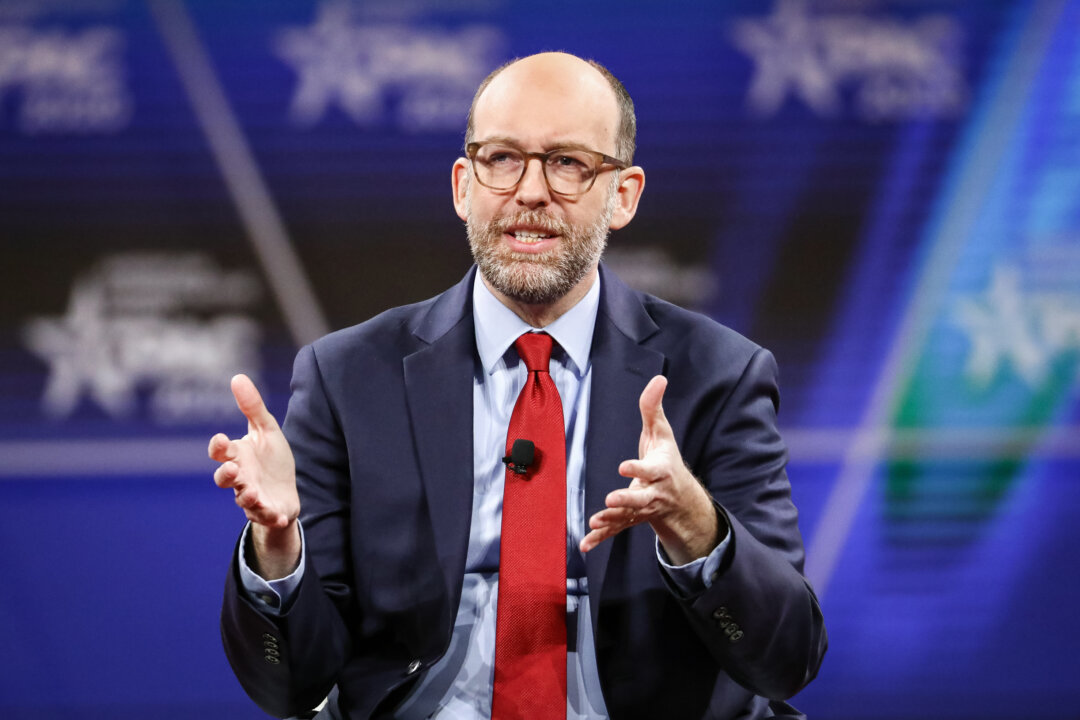If confirmed, Russell Vought will succeed Shalanda Young, who has served in this role since March 2022.
Senate Democrats questioned Russ Vought, President-elect Donald Trump’s choice to lead the Office of Management and Budget (OMB) for a second time, regarding his views on the power of the purse.
Vought, who succeeded Trump’s first OMB director, Mick Mulvaney, in 2019, appeared before the Homeland Security and Governmental Affairs Committee for his Jan. 15 confirmation hearing.
Lawmakers repeatedly asked Vought if he would uphold the law and refrain from withholding funding for programs Congress has appropriated.
“Given your record, I have serious questions about whether you can be trusted to carry out the laws that Congress has passed under the Constitution,” said Sen. Gary Peters (D-Mich.).
Peters, the top Democrat on the committee, cited a 2020 Government Accountability Office report that determined Vought violated the Impoundment Control Act—a 1974 law asserting Congress’ power of the purse and installing barriers on the president’s powers to slash funding approved by Congress—by freezing security assistance for Ukraine.
Vought disagreed and noted that the OMB “followed the law consistently” during his tenure.
“We did not hold inappropriately funds,” Vought said. “We were engaged in a policy process with regard to how funding would flow to Ukraine. We released the funding by the end of the fiscal year.”
Sen. Richard Blumenthal (D-Conn.) questioned if Vought believed the Impoundment Control Act was constitutional.
“No, I don’t believe it’s constitutional,” he replied. “The president ran on that view. That’s his view, and I agree.”
Blumenthal stated that Vought would “simply take the law” into his own hands and disregard previous Supreme Court rulings that deemed the legislation to be constitutional.
“I’m astonished and aghast that someone in this responsible position would, in effect, say that the president is above the law and that the United States Supreme Court is entitled to their opinion, but mine should supersede it,” the longtime senator stated
“It’s just baffling that we are in this, I think, unprecedented moment in the history of this country. And I think our colleagues should be equally aghast because this issue goes beyond Republican or Democrat.”
Vought resisted, responding that he did not express or imply that position on behalf of the incoming administration.
Sen. Rand Paul (R-Ky.), the committee chair, expressed understanding of his Democratic colleagues’ views on the power of the purse. However, he criticized Congress for its poor performance in defining clear guidelines.
“If we want to limit what the president does with moving money around, which I’m sympathetic to, we should have the power of the purse,” Paul said.
“We got to write better legislation.”

If confirmed, Vought will succeed Shalanda Young, who has served in this role since March 2022.While not the central focus for lawmakers, senators did make passing references to Vought’s contributions to the Project 2025 agenda.
In his prepared testimony to the senators, the president of the Center for Renewing America championed “a strong interagency process” to facilitate the best results for the country.
“A strong interagency process delivers the best results for all Americans, and I believe OMB’s collaborative ethos is key to achieving those outcomes,” he said.
Vought stressed the importance of responsibly managing taxpayer resources to address the plight of the nation’s “forgotten men and women.”
“We have to use taxpayer dollars wisely because inflation—driven by irresponsible federal spending—taxes Americans twice,” Vought told lawmakers. “The average American household has lost roughly $2,000 of purchasing power since January 2021.”
Vought, the former vice president of the Heritage Foundation’s sister organization Heritage Action for America, co-authored Project 2025, the roughly 900-page policy blueprint that Trump repeatedly distanced himself from on the campaign trail.
The document contained a chapter titled “Executive Office of the President of the United States,” penned by Vought. This portion of the conservative policy playbook examines the top budget office and asserts that the OMB has been overrun by “careerists.”
He also advocated that the OMB advance the president’s economic agenda rather than individuals setting their own agenda. Additionally, Vought stated that the OMB director and his political staff should submit a fiscal objective to the president in the early stages of the budget development process to rein in the government’s “fiscal irresponsibility.”
“Though some mistakenly regard it as a mere paper-pushing exercise, the President’s budget is in fact a powerful mechanism for setting and enforcing public policy at federal agencies,” Vought wrote.
“OMB’s budget team plays a key role in executing policy across the executive branch, including at many agencies wrongly regarded as ‘independent.’”
In a November interview with Tucker Carlson, Vought recommended that the president-elect “move executively as fast and as aggressively as possible.”
“We have to solve the woke and the weaponized bureaucracy and have the president take control of the executive branch,” Vought said. “There may be different strategies with each one of them about how you dismantle them, but as an administration, the whole notion of an independent agency should be thrown out.”
Throughout the election campaign, Trump repeatedly disavowed Project 2025 and insisted that he never read the proposal.
“I have nothing to do with Project 2025,” Trump said in his only debate with Vice President Kamala Harris in September. “I haven’t read it. I don’t want to read it purposely. I’m not going to read it.”
Correction: A previous version of this article misidentified the state Sen. Gary Peters (D-Mich.) represents. The Epoch Times regrets the error.

